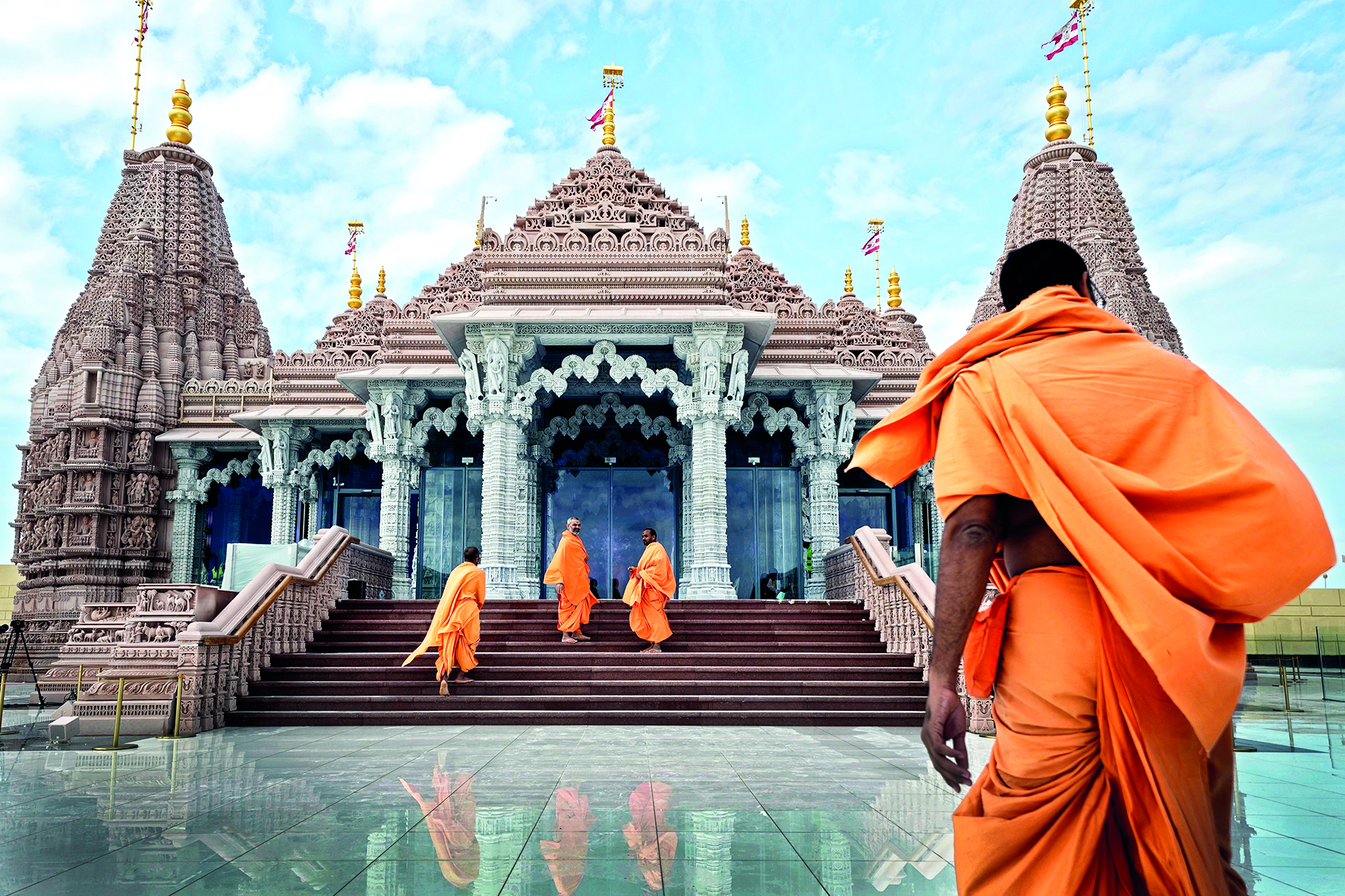Seven spires to represent 7 emirates: Architecture of first Hindu temple in Abu Dhabi has elements of UAE

Seven spires representing seven emirates of the UAE, carvings of camels, and national bird falcon, are part of the architecture of the first Hindu stone temple in Abu Dhabi, to give equal representation to the host country.
The temple built by the BAPS Swaminarayan Sanstha on a 27-acre site in Abu Mreikhah, near Al Rahba off the Dubai-Abu Dhabi Sheikh Zayed Highway, at a cost of around Rs 700 crore, is set to be inaugurated later today.
The land for the temple was donated by the UAE government.
The consecration of the idols began at the temple this morning. Prime Minister Narendra Modi will lead the dedication ceremony at the grand temple in the evening which will mark the culmination of the “Festival of Harmony” which began at the temple on February 10.
According to temple authorities, seven shikhars (spires) have been built at the temple representing the seven Emirates that come together to form the UAE.
“The seven spires have idols of deities, including Lord Ram, Lord Shiv, Lord Jagannath, Lord Krishna, Lord Swaminarayan (considered a reincarnation of Lord Krishna), Tirupati Balaji and Lord Ayappa. The seven shikhars represent the seven emirates of UAE,” Swami Brahmaviharidas, head of international relations for BAPS, said.
“The seven spires also pay homage to seven important deities, underscoring the interconnectedness of cultures and religions. Normally, our temples are either one spire, three, or five, but come here, the seven spires express our gratitude to the unity of the seven emirates. But at the same time, the seven spires enshrine seven important deities. “The spirals aim to promote unity and harmony in the multicultural landscape. Standing at a towering 108 feet, the temple will pave the way for the cultural integration of diverse communities in the region,” he added. To give equal representation to the host country, along with animals that occupy an important place in Indian mythology like elephants, camels and lions, the UAE’s national bird, the falcon, has also been included in the design.
“The camel; a symbol of persistence, commitment and endurance, has been etched into the carvings of the temple while drawing inspiration from the landscapes of the UAE,” said Som Singh, a stone artisan at the temple.
Apart from 15 tales from India, including the Ramayana and Mahabharata, stories from Mayan, Aztec, Egyptian, Arabic, European, Chinese and African civilizations have also been depicted in the temple.
While the outer walls of the temple are made using sandstone from India, the interior, made of white Italian marble, is adorned with intricately designed and carved columns and walls. Other Noteworthy architectural elements include two ghumats (domes), 12 samrans (dome-like structures) and 402 pillars. The two ghumats are the “Dome of Peace” and “Dome of Harmony”.
“The Dome of Harmony showcases five natural elements: water, fire, air, earth and space. There are carvings of animals such as horses and camels that represent the UAE. A Wall of Harmony, one of the largest 3D-printed walls in the UAE, features a video showcasing key milestones of the temple’s construction,” Singh said.
The architecture, a fine specimen of Hindu stone architecture, is devoid of steel for the erection of the structure.
“It is an ingenious use of science and technology, where carved stones are put together like a jig-saw, and then gravity pulls them into place,” said Vishal Patel, lead volunteer at the temple.
“Around 96 bells and gaumukhs are installed around the path leading to the temple. These 96 bells are a tribute to Pramukh Swami Maharaj’s 96 years of life,” he added.
During PM Modi’s two-day visit to the Gulf nation in 2015, the UAE allocated land for constructing a temple in Abu Dhabi.
This visit held significant diplomatic importance, as Modi became the first Indian Prime Minister since Indira Gandhi to visit this strategically vital Gulf nation in 34 years.



